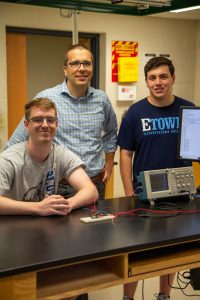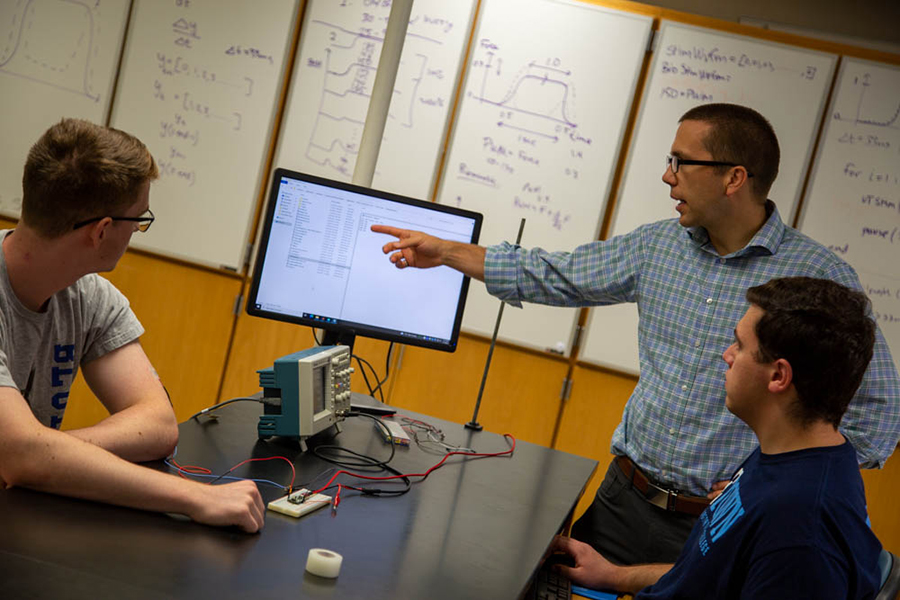Elizabethtown College students, Alex Kobilnyk ‘23 and Joe Kutteh ‘23 are teaming up this summer in the Engineering lab to test both electrical and mechanical stimulators in search of a low-cost, non-evasive solution for providing a sense of touch to a virtual arm.
The independent student research and collaboration with an Etown faculty mentor, is part of the Summer Scholarship, Creative Arts and Research Projects (SCARP) program.
Findings from this research ties into the “Real-time control of a virtual arm” SCARP project that is also taking place this summer and being conducted by Alex and Nathan Griffin ‘23. Read more about their research, which aims to make prosthetics cheaper and easier to use.
Title of Research
Low-cost, electrical and mechanical stimulators for non-invasive sensory feedback
Student Researchers
Joe Kutteh ‘23 – Computer Engineering
Alex Kobilnyk ‘23 – Mechanical Engineering major
Faculty Mentor
Mark Brinton, Assistant Professor of Engineering
What are you researching?
Alex: My research includes creating an electrical stimulator that sends electrical pulses to nerves in the forearm. The main goal is to compare the JND’s (Just-Noticeable Difference) of the electrical stimulator and the mechanical stimulator. A JND is how much you can change a value, such as amplitude, pulse width, and frequency in my case, and be able to recognize the difference. Unfortunately, due to microchip shortages, I have been unable to pursue this research, and instead, I have been helping with the testing mechanical stimulator and the fabrication of the electrode sleeve.
Joe: My research involves stimulating nerves two different ways. One with a vibrotactile motor and the other with electric pulses. I’m also developing Graphical User Interfaces (GUI) with MATLAB (a programming and numeric computing platform used by engineers and scientists to analyze data, develop algorithms, and create models) to control the motor. We will use data to make graphs (JNDs) to compare these two methods of stimulating nerves.
Why did you choose this topic?
Alex: I chose this topic because I wanted some experience in the electrical engineering field. Also, I wanted to gain exposure to coding in MATLAB.
Joe: I chose this topic because I thought it was interesting and it would help me to further develop my skills of writing code in MATLAB.
What is the most interesting aspect of this research?
Alex: I find this research interesting because it is crazy how just vibrating the surface of your skin or sending an electrical pulse into the body can simulate the sense of touch. I feel as if people,  including me, take for granted the sense of touch because they have never had to experience what it is like to lose this sense. However, for upper limb amputees, a prosthetic with this sense of touch will give the individual pleasure in bringing back a crucial sense that was lost.
including me, take for granted the sense of touch because they have never had to experience what it is like to lose this sense. However, for upper limb amputees, a prosthetic with this sense of touch will give the individual pleasure in bringing back a crucial sense that was lost.
Joe: The most interesting part of this project is developing the GUIs which allow us to communicate with and control the vibrotactile motor. The GUIs are also used to collect data when running tests and trials which will later be used to make JNDs.
How has Professor Brinton helped you throughout this experience?
Alex: Dr. Brinton has been a great help with my research experience so far. Starting in May I had little coding experience in MATLAB. However, Dr. Brinton has shown me multiple tools to fix errors in code, specifically the debugging properties.
Joe: I have enjoyed working with Dr. Brinton. He is very helpful and is always available for any questions that may arise.
Hear from the Faculty Mentor – Professor Mark Brinton
“Research always has its unforeseen challenges – though we didn’t expect devices getting lost in shipment and worldwide semiconductor chip shortages – but this required Joe and Alex to be innovative and thoughtful as they developed technology to explore non-invasive vibrotactile feedback.
“It has been a pleasure to interact with them and see them develop their coding skills and learn about non-invasive sensory feedback.”

